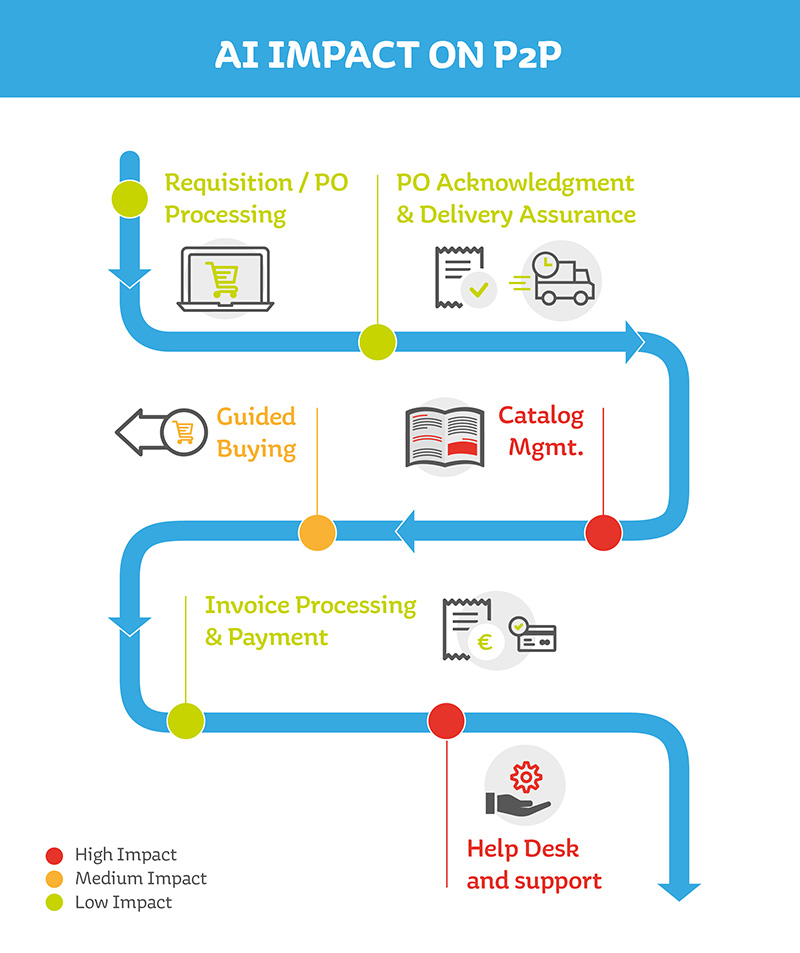GEP, a vendor of procurement management solutions, recently published a survey containing a wealth of invaluable findings for procurement divisions. It explores the potential benefits of artificial intelligence in the Procure-to-Pay process, a defining feature of which is the significant volume of data that need processing. The survey is based on the views of many procurement and/or technology experts and clearly demonstrates the major impact of AI.

The value of artificial intelligence in processing procurement data
Most companies have an extremely wide range of data sources. Transactions, contracts, files, reports and catalogues pump millions of data into the information system. An even larger amount of information circulates through the company's other business functions. It is clearly in the company's strategic interest to connect that information with its procurement data.
Artificial intelligence offers an innovative and truly effective solution in response to the three challenges that arise when processing data:
- The quality of the data entering the system
- The classification of data into actionable categories
- The volume to be processed (big data)
The beauty with artificial intelligence is that data is automatically consolidated and indexed in real time so that it can be processed as a continuous stream. Indicators, alerts and notifications are extracted automatically. In particular, all procurement decisions are taken to reflect the actual, up-to-date needs of each business function.
Welcome to a new dimension where procurement divisions can tap into true strategic value!
Specific applications of AI in P2P
Leveraging big data with artificial intelligence brings value to each step in the Procure-to-Pay process. It increases the effectiveness of each stage and also improves the entire P2P chain. Therefore, the right idea involves deploying AI throughout the process.
Data processing and exploitation
- Automate data consolidation, deduplication and categorisation.
- Target potential areas for saving money.
- Accelerate the decision-making process.
- Gain a clearer insight into the market.
- Anticipate supplier risks with greater accuracy.
Management of the purchase categories
- Improve the structure and standardise the nomenclature for each purchase category.
- Better identify potential economies of scale.
- Fine-tune indicators for greater precision.
Automation and real time
- Incorporate incoming data according to chosen intervals (which can be hourly).
- Immediately identify anomalies and trends.
- Define lead trajectories for each action.
- Improve the contribution of each procurement manager to overall performance.
Decision support analysis
- Measure cost variables before and after each purchase event to improve collective actions.
- Reduce the total cost of ownership (TCO). A previous article focusing on the TCO can help give this benefit of AI its full meaning.
Reporting
- Automatically generate reports in different formats incorporating dashboards.
- personalise analyses according to subjects and recipients.
Contract management
- Implement neuro-linguistic techniques to quickly and thoroughly revise contracts (example?).
- Dynamically manage the contract drafting calendar with notifications for key clauses.
- Detect and report any discrepancies with the aim of continually improving customer/supplier relationships.
Deploying artificial intelligence in P2P heralds a new dawn in efficiency. But it is a project in its own right that requires time, resources and energy. In addition to its impact on the procurement function, AI transforms the entire company. The right approach to gathering support is to tie the impact of artificial intelligence into the global strategy. Let's all be intelligent!








